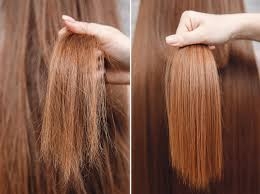Introduction
Have you ever wondered why your hair feels rough, dull, or lifeless even after using good shampoos? The answer might be your water. Hard water, loaded with minerals like calcium and magnesium, can strip away natural oils. Chlorine in tap water can also weaken your strands over time.
Poor water quality doesn’t just make hair dry. It can lead to breakage, itching, and even slow hair growth. Many people blame products, but the real culprit often flows straight from the shower.
For Stronger Hairs, Visit Best Hair Care Brand in Pakistan Natures Nest By Sana Abid.
In this article, you’ll discover 5 clear signs your water is damaging your hair. Plus, you’ll learn simple, practical fixes to restore softness, shine, and strength.
Sign 1 – Dry, Frizzy, and Rough Texture
Does your hair feel dry no matter what shampoo you use? It may even look frizzy and rough after washing. Brushing becomes a challenge, and tangles appear more often.
This happens when minerals like calcium and magnesium build up on your hair. They block moisture and make strands stiff. Over time, this build-up makes your hair lose its smooth, soft feel.
How to fix it?
-
Use a clarifying shampoo once a week.
-
Apply a deep conditioning mask to lock in moisture.
-
Rinse your hair with filtered or soft water whenever possible.
Read More: https://www.articleted.com/articles.php
Sign 2 – Scalp Itching or Flakiness
Does your scalp feel itchy or dry after a shower? You might also notice small white flakes. They can look like dandruff but don’t always come with oiliness.
This often happens when minerals in water upset your scalp’s natural balance. Hard water can make the skin dry and sensitive. It also leaves residue that irritates the scalp.
How to fix it?
-
Rinse your scalp with diluted apple cider vinegar once a week.
-
Use a mild, pH-balanced shampoo to clean gently.
-
Massage your scalp lightly to remove residue and improve blood flow.
Sign 3 – Excessive Hair Fall or Breakage
Are you seeing more hair in your brush or shower drain? Your strands may also snap easily when combing. This can make your hair feel thinner over time.
Hard water often weakens the hair shaft. Minerals stick to each strand, making it heavy and brittle. As a result, your hair breaks more often and sheds faster.
How to fix it?
-
Use a protein-rich conditioner to strengthen weak strands.
-
Avoid overwashing; two to three times a week is enough.
-
Apply a lightweight leave-in conditioner to add protection between washes.
Sign 4 – Dullness and Lack of Shine
Does your hair look flat and lifeless, even after using good products? It may feel clean but lacks that healthy shine. Light no longer reflects well on the strands.
This happens when mineral residue coats your hair. It creates a film that blocks moisture and makes hair appear dull. Over time, this buildup reduces the natural glow of your hair.
How to fix it?
-
Wash with a chelating shampoo once or twice a month.
-
Apply nourishing oils like argan or jojoba to boost shine.
-
Finish your wash with a cold-water rinse to seal the cuticle.
Sign 5 – Slow Hair Growth and Split Ends
Does your hair seem stuck at the same length for months? You might also notice more split ends. Trimming helps for a while, but the problem keeps coming back.
Mineral buildup can block nutrients from reaching your roots. It also dries out the ends, making them weak and prone to splitting. This stops your hair from growing strong and healthy.
How to fix it?
-
Trim your ends regularly to prevent further splitting.
-
Massage your scalp with rosemary or coconut oil to boost blood flow.
-
Install a shower filter to reduce mineral deposits over time.
Prevention and Long-Term Solutions
Fixing the damage is good, but stopping it from happening again is even better. Simple changes in your routine can protect your hair for the long run.
Hard water problems often start in the shower. Installing a shower filter is an easy first step. It helps reduce mineral buildup and makes your water gentler on hair.
How to prevent future damage?
-
Use filtered or distilled water for your final rinse.
-
Do a weekly detox or clarifying treatment.
-
Keep your scalp healthy with regular oil massages and a balanced diet.
Conclusion and Call-to-Action
Water can play a big role in your hair health. Dryness, frizz, or slow growth may all point to water damage. The good news? Small changes in your routine can make a big difference.
Start with one or two fixes today. Use a clarifying shampoo, try a scalp massage, or add a shower filter. Over time, your hair will feel softer, shinier, and stronger.
Read More: https://medium.com/p/e00265d7b0de


